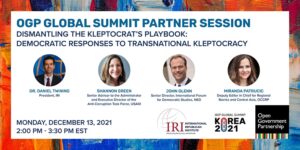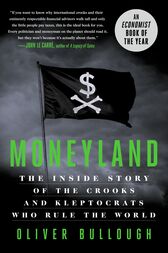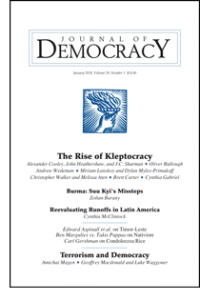It’s one of the few political problems that unites people across the political spectrum and across the globe, notes Ryan Heath of POLITICO’s Global Translations. But how can we actually fight corruption on a meaningful scale?
Paul Massaro, adviser to the bipartisan Helsinki Commission in Congress, told Global Insider there’s no way to defeat corruption — which may account for 10 percent of global GDP — without exposing money flows.
“Global corrupt networks that traverse multiple countries that are being abused, exploited by dictators, in many cases built by dictators, require enablers in the West. And these include lobbyists, lawyers, real estate, professionals, accountants,” adds Massaro, a former Penn Kemble fellow at the National Endowment for Democracy (NED).
 “Kazakhstan, the Nazarbayev regime, pioneered many of the kleptocratic tactics we see around the world today,” he observes. “The hiring of former Western officials, using Western courts to essentially outsource any need of the rule of law, suing people into oblivion just to run them out of money. Kazakhstan was really one of the early examples of modern dictatorship.”
“Kazakhstan, the Nazarbayev regime, pioneered many of the kleptocratic tactics we see around the world today,” he observes. “The hiring of former Western officials, using Western courts to essentially outsource any need of the rule of law, suing people into oblivion just to run them out of money. Kazakhstan was really one of the early examples of modern dictatorship.”
U.S. and European lawmakers gathered on Capitol Hill on Tuesday for the inaugural meeting of the Inter-Parliamentary Alliance against Kleptocracy (IPAK), whose objective is to harmonize the Western world’s approach to countering corruption. Members of the cross-border, cross-party coalition view corruption as “the uniting force of dictators” — a systemic threat undermining trust in democracy, and siphoning trillions of dollars in stolen funds from the global financial system, Zachary Basu reports for AXIOS:
- IPAK was officially formed in December, riding the momentum from a banner year of new policies, strategies and revelations about the scale of 21st century corruption.
- The Pandora Papers investigation by the International Consortium of Journalists revealed extensive details about hidden assets owned by wealthy individuals around the world — including elected officials and heads of state.
- The Biden administration released the first-ever U.S. government strategy on countering corruption during the “Summit for Democracy” last month, vastly increasing the intelligence and diplomatic resources dedicated to the issue.
- The U.S., EU, Australia, Canada and the U.K. either adopted or expanded their use of Magnitsky-style sanctions, which target individuals involved in serious human rights abuses or corruption.
 “The bad guys hate it when we get together,” said Rep. Tom Malinowski (D-N.J.). “They’re much more threatened when the United States, European Union and our democratic allies around the world speak in a single voice.”
“The bad guys hate it when we get together,” said Rep. Tom Malinowski (D-N.J.). “They’re much more threatened when the United States, European Union and our democratic allies around the world speak in a single voice.”
There is slow progress towards a minimum global tax rate, and some suggestions that democracies might finally be recognizing they’re up against an existential threat in kleptocracy and need to unite to survive, adds Oliver Bullough, the author of Moneyland, why thieves and crooks now rule the world and how to take it back.
Kazakhstan is not too bad by Central Asian standards, but that isn’t saying much, being as the other states are the “black hole” that is Turkmenistan, the basket cases that are Tajikistan and Kyrgyzstan, and the kleptocratic case study that is Uzbekistan, he writes for Coda Story. According to official statistics, wealth inequality is close to U.S. levels, with the top 10% of the country owning around almost two-thirds of everything, and the bottom 50% just one-twentieth.
USAID Administrator Samantha Power is “the most outspoken counter-corruption voice in the administration,” Massaro told POLITICO, pushing hard for aid to be matched with accountability measures. Chandana Ravindranathat the National Security Council “has done an extraordinary job getting commitments out of the various agencies” as part of the Biden administration’s counter-corruption strategy, he said.
 The US should support the movement to create an International Anti Corruption Court, Mark Wolf, Chair of Integrity Initiatives International (III), tells BBC’s HARDtalk (above).
The US should support the movement to create an International Anti Corruption Court, Mark Wolf, Chair of Integrity Initiatives International (III), tells BBC’s HARDtalk (above).
The move would “demonstrate its commitment to those people abroad who yearn to see autocratic kleptocrats held accountable,” said Wolf. “The US should, for example, amend the Foreign Corrupt Practices Act to authorize the prosecution of kleptocrats who demand bribes, as well as the businesses that pay them,” he said.
Integrity Initiatives International has received support from the National Endowment for Democracy to support it’s work in Ukraine, the III Youth Leaders Network, and initiatives concerning the connection between corruption and human rights violations.
#Kazakhstan, the Nazarbayev regime, pioneered many of the kleptocratic tactics we see around the world today, fmr @NEDemocracy Penn Kemble fellow @apmassaro3 tells @politico‘s @PoliticoRyan
— Democracy Digest (@demdigest) January 12, 2022







